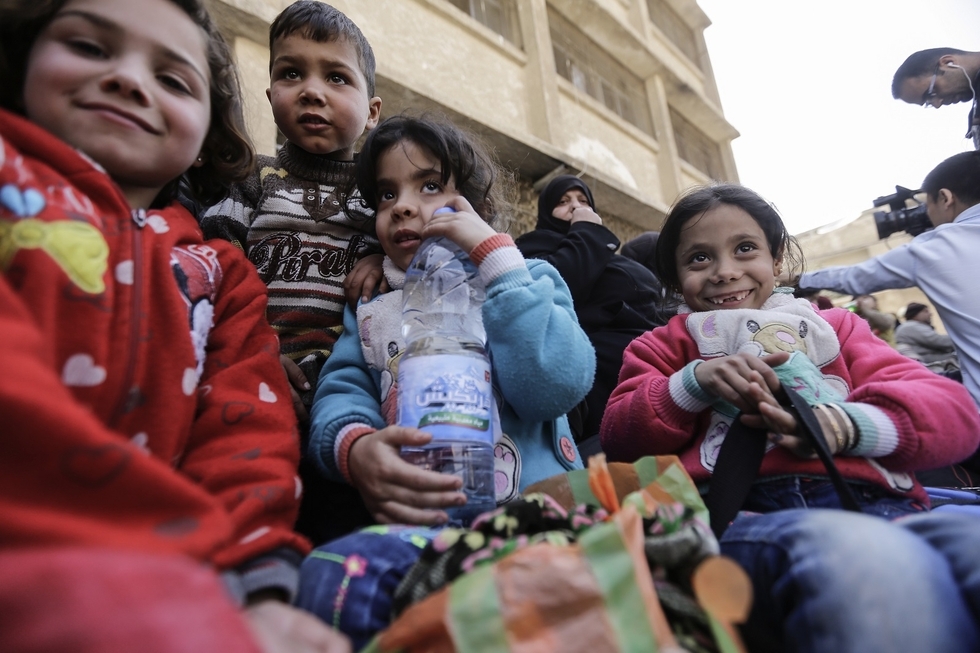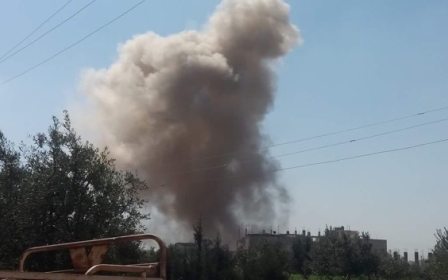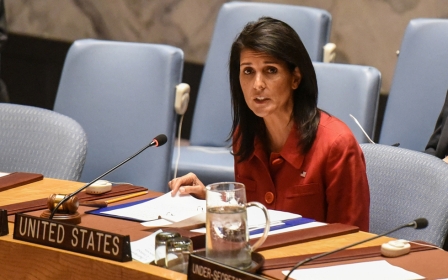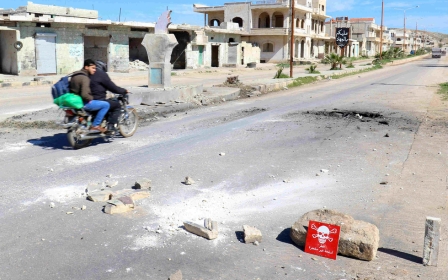Some 300 civilians evacuated from Syria's Ghouta

Over 300 people have left Syria's eastern Ghouta district since a humanitarian corridor opened there, RIA news agency cited a representative for Russia's ceasefire monitoring centre in Syria as saying on Wednesday.
"Since the humanitarian corridor started working in the region of eastern Ghouta, more than 300 people have left, the majority of these people left in the last few days," RIA quoted Major General Vladimir Zolotukhin as saying.
Some 150 people were bussed out of East Ghouta on Tuesday in the first evacuation of civilians from the rebel-held zone since Syria's government began a fierce assault three weeks ago.
Separately, hundreds of rebel fighters left the district of Qadam, south of Damascus, in a deal negotiated with the government.
The area's 400,000 residents have lived under a devastating siege for five years that has made food scarce and left hospitals unable to cope.
On Tuesday, civilians, including wounded residents, were transported out of the rebel-held town of Douma, Ghouta's largest, by the Syrian Arab Red Crescent and into government-held territory.
After reaching the government-held Wafideen checkpoint on the edge of the rebel enclave, 56-year-old Ratib Sheikh Bakri burst into tears.
His right leg had been amputated at the hip and he had been waiting for a medical evacuation from Douma for a year and a half to seek treatment.
"I am coming to be treated in Damascus before my second leg goes too," he told AFP, wiping his eye with a tissue.
Bakri said the living conditions were "dire" in Ghouta, where his three daughters and two sons are still trapped.
On Monday, the United Nations said more than 1,000 people, mostly women and children, were in urgent need of medical evacuation from Ghouta.
The area has been under a Russian-backed government offensive that has killed more than 1,100 people and wounded thousands more.
It has also split the enclave into three isolated opposition-held pockets.
Deal to evacuate wounded
Jaish al-Islam, the rebel faction that holds Douma, said on Monday it had negotiated a deal with Russia and the UN to evacuate sick and wounded residents out of the town.
Inside Douma on Tuesday morning, residents could be seen lugging duffel bags and suitcases to a group of waiting buses and ambulances.
Red Crescent workers checked their names against a list, as women and children waved goodbye to a crowd of male relatives who would remain in the town.
An AFP correspondent there saw 30 sick and wounded people.
A Syrian military source on Tuesday gave a similar number, saying a total of 24 men, 44 women and 78 children were evacuated. The source said 10 sick people were among them.
Another military source had told AFP earlier that "no fighters" would be evacuated as part of the convoy.
Meanwhile, the army evacuated several hundred rebel fighters from a small pocket it had held for years south of Damascus on Tuesday and bussed them to the north of the country, a monitor said.
The Syrian Arab Red Crescent confirmed the evacuation from the district of Qadam. AFP's correspondent in the northwestern province of Idlib, the last to largely escape government control, saw some of the estimated 300 fighters arrive.
"An agreement reached in September 2017 between the regime and Islamist factions, including Hayat Tahrir al-Sham (HTS), was implemented today," the Syrian Observatory for Human Rights said.
HTS is made up mostly of former members of al-Qaeda's ex-affiliate in Syria. The other main group present in Qadam was Ajnad al-Sham.
"At least 1,300 people, including fighters with their relatives, have been transferred," said Rami Abdel Rahman, the Britain-based observatory's head.
Russia warns against 'US plans'
Russia said on Tuesday it had information that the United States planned to bomb the government quarter in Damascus on an invented pretext, and said it would respond militarily if it felt Russian lives were threatened by such an attack.
Valery Gerasimov, head of Russia's General Staff, said Moscow had information that rebels in Eastern Ghouta were planning to fake a chemical weapons attack against civilians and blame it on the Syrian army.
He said the United States intended to use the fake attack as a pretext to bomb the government quarter in nearby Damascus where he said Russian military advisers, Russian military police and Russian ceasefire monitors were based.
"In the event of a threat to the lives of our servicemen, Russia's armed forces will take retaliatory measures against the missiles and launchers used," Gerasimov said in a statement.
Russia has previously accused rebels in Syria of preparing to use toxic agents in Eastern Ghouta so they could later accuse Damascus of employing chemical weapons.
Damascus denies Western allegations that government forces have used chemical weapons.
US Ambassador to the United Nations Nikki Haley warned on Monday that Washington "remains prepared to act if we must," if the UN Security Council failed to act on Syria.
New MEE newsletter: Jerusalem Dispatch
Sign up to get the latest insights and analysis on Israel-Palestine, alongside Turkey Unpacked and other MEE newsletters
Middle East Eye delivers independent and unrivalled coverage and analysis of the Middle East, North Africa and beyond. To learn more about republishing this content and the associated fees, please fill out this form. More about MEE can be found here.




